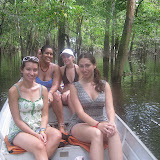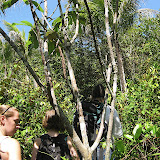
I should really be sleeping right now, but I just discovered something wonderful in a very unlikely place. I was at my dad's house, sitting in the backyard drinking tea with my dad, stepmom, and two of their friends discussing artwork, when my dad brought up an exhibit he had recently gone to with Bella's relatives. The exhibit was called "An American Index of the Hidden and Unfamiliar" and was displayed at the Whitney Museum of American Art in NYC until the 24th of june. My dad was so enthralled by this exhibit that he tried to describe it to us to the best of his ability; I was astonished.
The artist's name is Taryn Simon. Her goal, put simply, with this exhibition was to capture views that relayed previously unknown information to the American public. She spent a lot of time conducting research about unknown and unfamiliar facts in American history, and went on a journey throughout the United States to photograph the evidence of their existence. The result, from what I've heard and seen online, is breathtaking. I will give an example. The first photograph in the exhibition is of a stark white wall. Two red cables come up out of the ground in front of the ground and are plugged into the wall. You look at the photo, come up closer to read the caption, and then back away after knowing what the photo is trully of. Apparently, there are two cables that flow underneath the Atlantic from England to a small city in New Jersey; these cables are responsible for all intercontinental interaction between Europe and America, and the only place in America that you can see the origin of this interaction is in this room, in this building, in some small city in New Jersey, of which this photo was taken. The most shocking and captivating image my dad described, was a black canvas, with black orbs surrounded by a neon blue aura. Upon reading the caption the viewer learns that the photo is actually of nuclear waste capsules at the extremely well guarded and enclosed, partly-underwater Nuclear Waste Storage Facilities in Arizona. An extremely limited number of people is allowed into this facility, due to high radioactive activity and extreme security, but she was allowed in for only a few minutes to take her photo so that she may reveal it to the American public in this exhibition. Fascinating. I couldn't find a sharper image of it because the exhibition took place so recently, but the image I found is in the upper left hand corner of this post.
The exhibition was closed down in New York, but the next stop will be Frankfurt, Germany in September, and I'm almost crazy enough to go there to check it out.
My dad's description of the exhibition made me think about a lot of things. It made me think about creativity, limiting access to information, and about how we process information in the first place. The creativity part is pretty self-evident; the woman's incredible, but what's even more interesting is how difficult it was for her to access these places, get to these objects/scenes/views and photograph them so that America can see what the truth looks like. I think it's great that she did eventually gain access to these places and displayed and explained what she found, but how much work did it take? Who is granted this sort of access? Who is not?
Even more interesting, when you look at one of these photos without reading the caption, what do you think of? Certainly (or at least probably) not of nuclear waste capsules. You just see the image and make as much sense out of it as you can. You look at colors, you make associations, you probably take the environment you're in into account, try to piece together what you already know with the information in front of you and make sense out of it. And once you've made sense out of it you see the image in a whole new light. It's no longer just a bunch of random colors and shapes. And what's unique about all this is the human capacity and tendency of eluminating things for other humans, for starting from something that is completely unknown and building upon it for generations and generations until we have very strong grounds for knowledge, textbooks, facts, laws of nature.
This exhibition is incredible because we are bridging what we know and what we don't know with our instincts, our very basic processing of information--the interception of colors and shapes, our intuition, our emotions--and we are calling it art.





